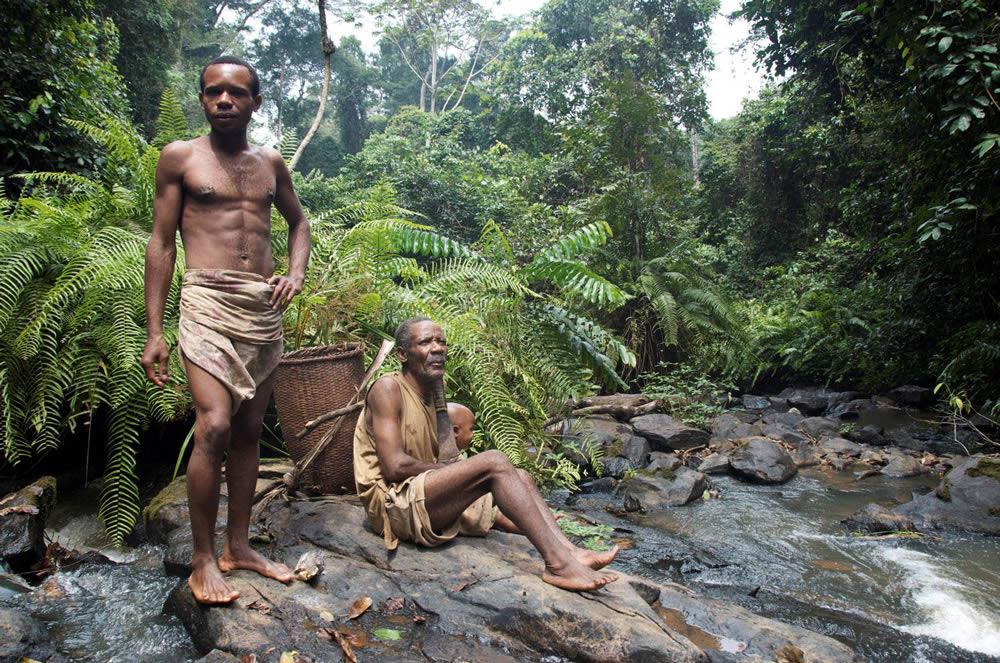Cameroon:
Supporting community organisations to defend the rights of indigenous people in Cameroon

“The forest provides the entire basis for the indigenous Pygmy people’s existence, including the houses they build and the foods, water and medicines they need. It is also the home of their ancestors – vital spiritual sites in their world view” says Patrice Kamkuimo from the Centre for Environment and Development, an NGO in Cameroon that supports community rights for forest people.
Something this sacred and important should not be taken away from those it belongs to, but that is what happened to the Baka people who live in the Boumba Bek and Nki National Parks in South East Cameroon. National authorities made a secret decision to forbid human activity in the national park where they lived. They had no seat at the table when the decision was made, and Cameroon’s laws didn’t recognise their rights to the land.
Their story is remarkably common amongst the indigenous Pygmy peoples in Cameroon, and this case and others like it give one of the clearest examples of why the project on Making the Forest Sector Transparent matters.
Mobilised by a consortium of local NGOs and supported by a small grant, the Baka community fought back. The NGOs informed local people of the plans, and then trained community members in mapping techniques to document customary and traditional practices and land rights. The Buma’a Kpode (meaning ‘one heart’) association was set up to receive further grant support for logistics and legal training. Newly able to articulate its rights in discussions with the park authorities, the community saw its rights protected in the management plans passed to the Prime Minister for signing in 2011. They are now collaborating with officials on monitoring to ensure that what has been promised is delivered.
“The bullying, repression and arrests of Baka people that happened in the past have significantly decreased, and now we are sitting at the same table with government officials and discussing the modalities of use of the parks by Baka” said Ernest Adjina, a Baka from Buma’a Kpode.
In the municipalities of Mbang and Batouri, what the network did went further. Lobbying the deputy mayor resulted in Pygmy minorities being included for the first time in the management of royalties from the forest and of the community forest in general. This benefits the 90,000 people in the municipalities, including ten Pygmy villages.
There are other examples of how civil society support has helped bring communities like the Pygmies into the conversation. Take the 2009 action plan for the Forest and Environment Sector Programme for Pygmy peoples, which initially failed to engage with the very population it was targeting. The Pygmy Action Cooperation Research Network (RACOPY) worked with local groups to formulate recommendations, such as cutting middlemen out of the transfers of forest funds. The Ministry of Environment (MINFOF) and the Ministry of Social Affairs eventually integrated these recommendations into the 2010 action plan, benefitting approximately 60,000 people. The network is now leading civil society input into the official process of revising the forestry law.
There is now a much greater sense of ownership of the forest; better managed income has seen new wells, classrooms and roads built."
Other activities focus on making sure those in charge of community-managed forests are held to account. For example, community royalties from deals with logging companies in Afanloum Forest were managed by a self-appointed group of just four people who had consistently abused the system, handing out multiple logging contracts without working out the amount of timber that could be cut sustainably. Growing community dissatisfaction as the forest suffered eventually led to efforts to physically block the activities of companies logging the area.
Following training and awareness raising activities funded by the small grant system the community decided to review the management of the forest. They elected a committee representing all villages of the forest, set up new rules for forest management and enlarged membership to women and youth. There is now a much greater sense of ownership of the forest; better managed income has seen new wells, classrooms and roads built, while authorities and companies can better engage with communities as they have legitimate, fairly elected representatives.
All these examples show how strategic support to local NGOs for awareness-raising and community training activities can quickly translate into significant changes in forest peoples’ lives, and that inclusive participation is the key to the sustainable and accountable management of forests. According to Patrice: “When local communities are well aware of their rights and are helped to claim them, the management of forests can be for the benefit of us all: –our work in Making the Forest Sector Transparent in Cameroon has confirmed this assumption”.
But such local successes from civil society and community organisations need to be complimented by national and international policy processes. In Cameroon, the revision of the national forest law offers an opportunity to enshrine better principles for the future. This will be a test of the real commitment of the government to ensuring local people have a say in how their forests are managed.
